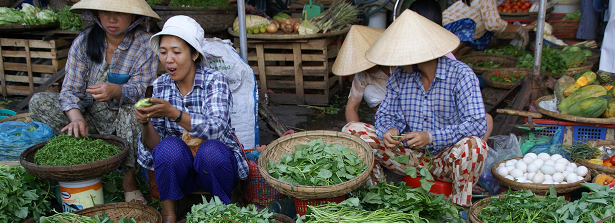
The Food & Business Knowledge Platform is organizing the next meeting of the Dutch Community of Practice on Food Systems, which will focus on the challenge of food systems governance. Participants will gain insight into governance mechanisms in current food systems, and on what changes in governance systems are needed to move towards more sustainable food system outcomes. The meeting takes place in Utrecht, starting at 09:30 and followed by a networking lunch at 12:00. The meeting is by invitation only; if you are interested in attending, please send an email to .
Globally, a transformation of the food system is needed to achieve SDG2 and other SDGs. This implies that change needs to happen at various levels: the individual, community, company, national level, and at international institutions. The fact that these changes are needed in combination makes this transformation a very complex process. Who gets to decide what a future food system looks like and who will take the lead are key questions in this process. In this context, governance of transformations as well as governance of existing food systems is an important topic which has not yet received much attention so far.
Food Systems CoP meeting on Governance Mechanisms
The meeting will address the following knowledge questions:
- What are key governance mechanisms that influence food system outcomes?
- What are the power dynamics in food systems governance? Who takes the lead, who has decision making capacity for the various parts of the system, whom else has influencing power? (and should that be improved, for SDG impact?)
- What works to foster behavioural change, in institutions, in companies, societies, systems?
Objectives of the meeting are:
- Share recent insights on food systems governance from both research and practice.
- Understand current mechanisms for food systems governance and their strengths and weaknesses.
- Build a common understanding on how to improve the current food system approach with elements of governance, power and politics.
Programme
9.30 Introduction to the meeting
9.40 Food systems governance mechanisms
By Otto Hospes, Associate Professor Public Administration and Policy, Wageningen University
10.00 Q&A
10.15 Discussion tables centered around specific cases (2 rounds):
- Framework to analyze power dynamics in transitions in food systems & to develop related action perspectives.
By Nina de Roo, Wageningen CDI
- Sustainable Agrifood system strategies project in Kenya and Tanzania: governance aspects of the pathways to improve food systems.
By Francesco Rampa, ECDPM
- Oxfam Novib. Advancing free, prior and informed consent.
By Madelon Meijer, Oxfam Novib
Output discussion tables:
- Insights about current food systems governance
- Ideas for improvements (short-term/longer-term)
11.30 Plenary wrap-up and Conclusions
Facilitated by Paul Engel
12.00 End of meeting and opportunity for networking & lunch
Cases for discussion, in more detail
WageningenUR/Centre for Development Innovation. Framework to analyze power dynamics in transitions in food systems & to develop related action perspectives WUR/CDI, together with other WUR departments, is currently developing an analytical framework to analyse power dynamics in socio-technical transitions in food systems in sub-Sahara Africa and Asia, which hooks on to insights from research done on power dynamics in transitions in the environmental sustainability domain. In 2020, it is planned to analyse power dynamics in selected case studies of food systems transitions under the theme food security and valuing water. This is expected to generate an overview of lessons learned about the role of power dynamics in transitions in food systems; insights in the barriers for change created by existing power relations; and action perspectives for selected stakeholders and the WUR on what could be done to ensure that longer term transition processes in the food domain adequately tackle unequal power relations (and possible set-backs).
During the CoP meeting, WUR is interested to present and validate the initial findings of interviews and a literature review, and determine and prioritise the specific needs of stakeholders in relation to power and politics in food systems.
ECDPM – Sustainable Agrifood System Strategies project in Kenya and Tanzania. Within the SASS project, governance is the key aspect. Based on comprehensive food systems analysis together with stakeholders in several areas of Kenya and Tanzania, currently concrete pathways are being explored to tackle food systems bottlenecks. This includes exploring what is politically feasible, given the different politico-economic and other factors, given the stakeholders involved. For example, in a recent workshop in Nairobi, opinions varied on the best pathways to promote the consumption of indigenous vegetables: whether the government should provide a mandatory blending guideline – for example blending the flour of the country’s staple ugali with indigenous vegetables – or whether the private sector should tackle blending voluntarily. “Inclusive policy processes that involve relevant stakeholders could lower the risk for court challenges; while information campaigns that highlight the health benefits of indigenous vegetable consumption could increase consumer acceptance.”
Further reading:
- https://ecdpm.org/sustainable-agrifood-systems-strategies/ and
- https://ecdpm.org/talking-points/connecting-dots-sustainable-food-systems-kenya/
Oxfam Novib – Advancing free, prior and informed consent – Partners of Oxfam use several methodologies to facilitate communities’ voice in decision making related to their livelihoods. An example is about how to put commitments on free prior informed consent (FPIC) into practice. FPIC is important and it is a prominent human rights, environmental and governance issue, including, among other aspects, rapidly escalating violence towards people who peacefully speak out on land-related issues. A methodology has been developed including time-bound, measurable steps that either directly advance free, prior and informed consent or improve underlying human rights or governance measures that create the framework in which it can be strengthened. The time-bound and measurable nature of these steps allows banks, and others, to monitor progress.
Further reading:
References
- Food system governance: A systematic literature review. Otto Hospes and Anke Brons (2016). https://www.researchgate.net/publication/310457890_Food_system_governance_A_systematic_literature_review
- The political economy of food. Edited by Jody Harris, Molly Anderson, Chantal Clément and Nicholas Nisbett. IDS Bulletin July 2019. Volume 50 Number 2 https://bulletin.ids.ac.uk/index.php/idsbo/issue/view/239
- This event has passed.

